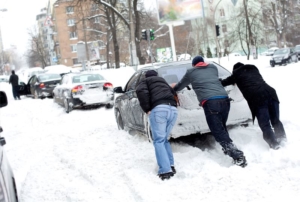 December’s here, and many of the nation’s roads have already seen the first snow of the season. With a tough winter ahead, it’s time to think about getting your car ready for the challenge.
December’s here, and many of the nation’s roads have already seen the first snow of the season. With a tough winter ahead, it’s time to think about getting your car ready for the challenge.
So why is winter weather so tough on your vehicle—and what can you do to ensure that your car or truck is operating at its best, no matter what the temperature? Let’s look at some of the ways winter weather affects your car’s systems.
Tires
Winter ice and snow can quickly turn a safe driving surface into a treacherous gauntlet. And worn or bald tires can further reduce your car’s ability to grip the road. Be sure to have your tires checked before the winter driving season begins.
A quick way to assess your tread quality is the penny test. Place a penny in the grooves of each tire’s tread. If you can see Lincoln’s entire head, your tires are worn and are not delivering the traction you need to handle winter weather. Cold weather can also cause your tires to lose pressure at severe temps, so have your tire pressure checked as well. And if you live in a region with harsh winters, investing in a set of quality snow tires can be a literal lifesaver.
Brakes
Often your brakes are your only protection against an accident, especially in bad weather. Icy roads are a challenge for even new brakes—and worn brake pads or shoes can greatly reduce your braking efficiency as well as your vehicle’s stopping power. A quick brake checkup can tell you if you need new pads or shoes.
Wipers
We expect a lot of our windshield wipers, especially in snow. Before blizzard season strikes, be sure your wipers are ready for the challenge. Worn, cracked, or brittle wiper blades can trap ice and snow, reducing your wipers’ effectiveness, diminishing visibility, and contributing to accidents. Check that your wiper blades are smooth and supple, and that your wiper fluid reservoir is full before you hit the road.
Fluids
Winter prep is also an ideal time to check your vehicle’s fluids. Antifreeze should be changed every 30,000 miles or so—check the manufacturer recommendations in your vehicle’s manual. Old antifreeze becomes contaminated with grit and dirt, causing it to lose efficiency and leaving your vehicle at risk for freeze-ups.
Transmission
Winter weather is especially tough on your vehicle’s transmission. Your transmission has to work harder when your vehicle is fighting through snow, climbing icy hills, or towing cargo. And even in cold temps, you can overwork (and overheat) your transmission. Also, road grit and dirt, combined with harsh salts and ice-melting chemicals, can reduce the viscosity and lubricating power of your transmission fluid. Checking and replacing your transmission fluid now can save you a lot of headaches later.
Other winter challenges to your transmission can include…
- Contraction—In severe cold, essential parts of your car’s transmission contract, leaving room for leaks and promoting faster wear.
- Problems Shifting—Cold weather can cause your vehicle to seem clunky or slow when shifting. The stress placed on your transmission’s moving parts now could result in transmission failure later on.
- Water—Water inside your transmission is never good news, and it could mean that you’re in for a major repair bill. Water expands upon freezing, which can create cracks in your transmission, requiring a rebuild or replacement transmission.
Don’t let winter sideline your car, truck, or SUV. Come in and see us at Main Line Transmissions, and we’ll give your vehicle a pre-winter checkup and transmission diagnostic. Call or drop by today!

 : 610-647-8484
: 610-647-8484 : 610-647-8405
: 610-647-8405